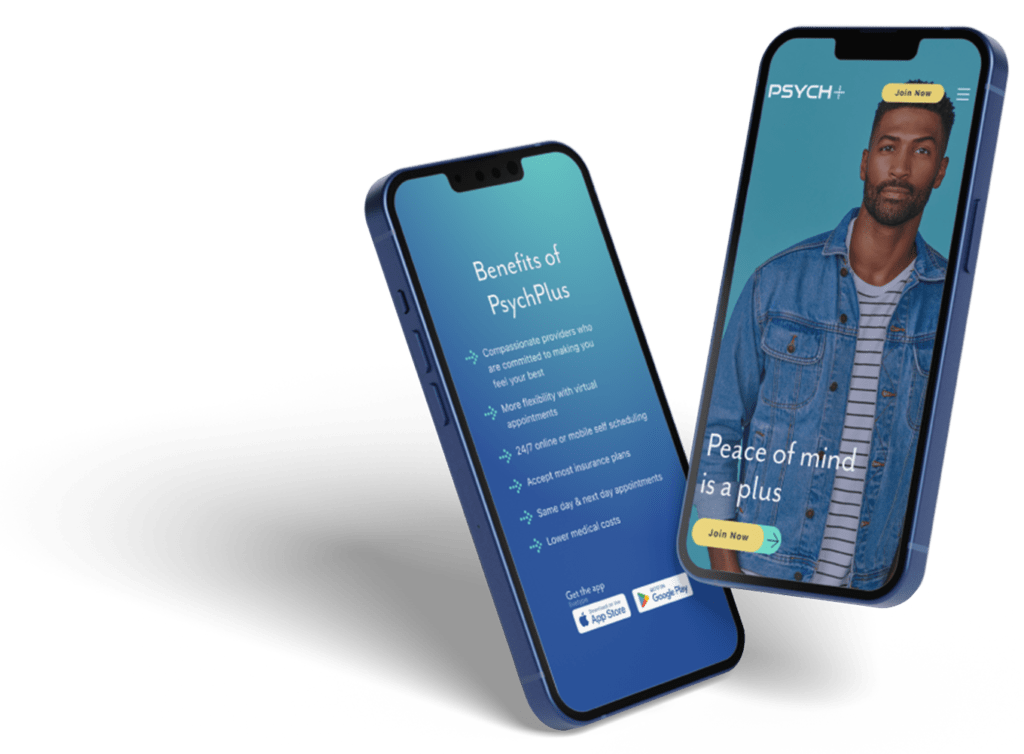Bipolar Psychiatrist in Mckinney
Your path to healing begins with our trusted psychiatrist in Texas, where compassion meets expertise. Empowering minds, healing hearts.
Discover Expert Care: McKinney’s Bipolar Psychiatrist
Bipolar Psychiatrist in Mckinney TX: Finding Expert Help
McKinney’s Source for Bipolar Support: Trust Our Expertise
Your Path to Stability Starts Here: McKinney’s Bipolar Psychiatrist
Empowering Lives, Restoring Balance: McKinney’s Trusted Expert

Featured in
At Psych Plus, we recognize the complex and often challenging nature of bipolar disorder. Our team of dedicated and board-certified psychiatrists specializes in providing comprehensive care tailored to address the unique needs of individuals living with bipolar disorder.
Bipolar Psychiatrist in Mckinney TX: Finding Expert Help
At Psych Plus, we recognize the complex and often challenging nature of bipolar disorder. Our team of dedicated and board-certified psychiatrists specializes in providing comprehensive care tailored to address the unique needs of individuals living with bipolar disorder.


Why Choose Psych Plus for Bipolar Disorder Care:

Bipolar Disorder Expertise
Our psychiatrists in McKinney have extensive experience in diagnosing and effectively managing bipolar disorder. They stay updated with the latest advancements in bipolar disorder treatment to ensure you receive the most effective and evidence-based care available.

Personalized Treatment
We believe in creating individualized care plans that consider the specific needs and circumstances of each patient. Our psychiatrists work closely with you to develop a customized treatment approach that promotes stability, mood regulation, and overall well-being.

Cutting-Edge Interventions
Psych Plus is dedicated to providing the latest and most innovative treatments for bipolar disorder. Whether it involves medication management, psychotherapy, or other evidence-based approaches, we utilize a comprehensive range of strategies to address the various aspects of bipolar disorder.

Supportive Environment
We understand the impact that bipolar disorder can have on individuals and their families. Our clinic provides a compassionate and understanding space where you can openly discuss your concerns. We offer support to help you or your loved one effectively manage the challenges associated with bipolar disorder.
Don’t wait to seek the high-quality bipolar disorder care you deserve. Contact Psych Plus today to learn more or schedule an appointment with one of our top-rated bipolar disorder psychiatrists in McKinney, Texas. Your path to stability and improved mental well-being begins here.
Most Insurances Accepted


Peace of mind at your fingertips.





Benefits of PsychPlus
Compassionate providers who are committed
to making you feel your best
More flexibility with virtual appointments
24/7 online or mobile self scheduling
Accept most insurance plans
Same day & next day appointments
Lower medical costs


Want to join our team?
Help reimagine access to modern and accessible mental healthcare.


Are you looking for a Bipolar Psychiatrist near you in McKinney?
Bipolar disorder can be a challenging condition to manage, but with the right help and support, it’s possible to lead a fulfilling life. If you or someone you love is struggling with bipolar disorder, finding expert help is crucial. Don’t let bipolar disorder control your life; seek professional help today and take control of your mental health!

The Connection between Bipolar Disorder and Schizophrenia
Bipolar disorder and schizophrenia are two serious mental illnesses that can greatly impact a person’s life. While these conditions share some similarities, they are distinct disorders with different symptoms and treatments. It is crucial to seek help from a mental health professional who specializes in treating bipolar disorder or schizophrenia, including mood disorders such as depressive or manic episodes. Effective treatment may involve a combination of medication, therapy, and lifestyle changes. Early diagnosis and intervention can significantly improve an individual’s quality of life and their ability to manage the symptoms associated with these disorders. Seeking expert help is essential for those dealing with bipolar disorder or schizophrenia.
Why Psychosis is a Common Symptom in Both Conditions
Psychosis is a common symptom in both bipolar disorder and schizophrenia due to similar underlying risk factors. Both conditions are mental disorders that can disrupt daily life and affect social well-being. According to the National Institute of Mental Health, biological factors, such as brain structure and gene variations, play a role in the development of psychosis. Additionally, the Substance Abuse and Mental Health Services Administration highlights the link between substance abuse and psychosis. It’s important to seek help from a skilled psychiatrist who specializes in these disorders to receive the best possible treatment and support.
Role of a Psychiatrist in Diagnosing and Treating Bipolar Disorder
A psychiatrist plays a crucial role in diagnosing and treating bipolar disorder. They are trained professionals who specialize in mental health and have the expertise to identify the symptoms of bipolar disorder. Through careful evaluation, they can determine if an individual is experiencing manic or depressive episodes and make an accurate diagnosis. Once diagnosed, a psychiatrist can develop a personalized treatment plan that may include a combination of medication, therapy, and lifestyle changes. Their goal is to help individuals manage their symptoms, improve their quality of life, and achieve stability. Seeking professional help from a knowledgeable and experienced psychiatrist is essential in effectively managing bipolar disorder and promoting overall mental well-being.
How Does a Psychiatrist Diagnose Bipolar Disorder?
A psychiatrist diagnoses bipolar disorder by conducting a comprehensive evaluation that includes a thorough psychiatric history, assessment of symptoms, and observation of mood patterns. They may also use screening tools, laboratory tests, and interviews with family members or loved ones to gather additional information. The goal is to rule out other conditions and accurately identify bipolar disorder for effective treatment.
Different types of bipolar disorder treatment
The treatment options for bipolar disorder encompass a range of approaches tailored to address the unique needs of individuals. Medication management plays a crucial role in stabilizing mood and reducing symptoms. Psychotherapy offers coping strategies and support for effectively managing bipolar disorder, aiding individuals to navigate their daily lives with greater ease. In severe cases or when other treatments prove ineffective, electroconvulsive therapy may be recommended as a potential solution. Transcranial magnetic stimulation, a non-invasive procedure utilizing magnetic fields to stimulate specific areas of the brain, is another treatment option. Additionally, neurostimulation treatments, such as vagus nerve stimulation or deep brain stimulation, may be considered in certain cases.

Medication management
Medications play a crucial role in managing bipolar disorder, helping to regulate mood swings and alleviate symptoms. Collaborating closely with a psychiatrist is essential to finding the right combination and dosage of medications for optimal results. Regularly reviewing and assessing the effectiveness of prescribed medications with a healthcare professional ensures that treatment remains on track. A systematic review, such as the one conducted by the Agency for Healthcare Research and Quality, can provide valuable insights into the effectiveness of different medications and therapies for bipolar disorder in adults. It’s important to be aware of potential side effects and communicate any concerns to the prescribing doctor. Consistently following the prescribed medication regimen is key to effectively managing bipolar disorder and achieving stability.

Psychotherapy
Psychotherapy plays a vital role in helping individuals with bipolar disorder improve their quality of life and manage their symptoms. Through cognitive-behavioral therapy (CBT), negative thought patterns and behaviors can be identified and transformed, empowering individuals to regain control over their lives. Family-focused therapy involves the entire family in understanding and supporting the individual with bipolar disorder, fostering a collaborative and nurturing environment. Interpersonal and social rhythm therapy focuses on stabilizing daily routines and enhancing interpersonal relationships, contributing to better overall well-being. Additionally, group therapy provides a sense of community and support, creating a space where individuals can connect and share experiences.

Electroconvulsive therapy
Electroconvulsive therapy (ECT) is a safe and effective treatment option for severe cases of bipolar disorder. Administered under general anesthesia, ECT involves the controlled administration of an electrical current to the brain, inducing a brief seizure. When medication and other therapies have not been successful, ECT may be recommended. The individual’s response to treatment and their specific needs will determine the number and frequency of ECT sessions. ECT has shown promising results in helping manage bipolar symptoms and is considered a valuable intervention in the field of psychiatry.
Help reimagine access to modern and accessible mental healthcare.




































